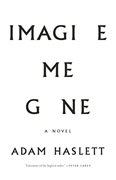Imagine Me Gone
Adam Haslett
book reviews:
· general fiction
· chick lit/romance
· sci-fi/fantasy
· graphic novels
· nonfiction
· audio books
· author interviews
· children's books @
curledupkids.com
· DVD reviews @
curledupdvd.com
newsletter
win books
buy online
links
home
for authors
& publishers
for reviewers

 |
Imagine Me Gone Adam Haslett Little Brown Hardcover 368 pages May 2016 |
|
Through the alternate voices of Margaret, her husband, John, and their three children (Alec, Celia, and Michael), Haslett explores the struggles of mental illness while also exposing the terribly cost of chemical dependency that is prescribed to treat it. Almost without our realizing it, Haslett’s novel traffics in memory, regret, and the fate of relationships in a world of family melancholy where, in matters of the heart, people sometimes do foolish and selfish things. Margaret, an American, has been living in London for several months when she meets handsome John, who seduces her with his “ready sense of mystery.” Yet hiding behind John’s steadfast exuberance and his very “British way of loving” is blinding mental fog.
Consumed by fear and stress over John’s inability to find work and support his family, Margaret refuses to speak to anyone about what is happening to her husband, though she admits that he needs someone “to watch over him.” There’s no denying that John has a pleasant temperament, shepherding his children together for hiking, camping, and walks in the bucolic New England wilderness, a cure-all for whatever financial troubles that always seem to be burdening the family. John, however, can't handle the medicines he’s been prescribed. As they indiscriminately flood his mind in order to “slow the monster,” this “beast of depression,” John finds himself paralyzed by an all-consuming sickness. Unsure how much to act on long-dormant family troubles, Margaret drifts along, accepting her lot while her three children begin to exhibit all of the side-effects of family dysfunction. Michael has an extraordinarily exhaustive intelligence, but he’s soon disappearing into other worlds, unable to bear the tension of his father’s illness. Blessed with an adventurous streak, he seems destined for a life as a musician, and his parents are at first keen to provide every advantage in encouraging their eldest son’s college endeavors. Instead, Michael returns to London, diving with gusto into the center of the 1980s underground new-wave scene, where exciting drugs circulate and the new music is represented by Giorgio Moroder and hard-hitting German industrialists. Michael begins to exhibit the same signs of mental illness as his father. Willfully blind to his own anger and blaming the cruelties of capitalism for dragging his father down, Michael begins to seek solace in Klonopin. Michael’s siblings adopt a very different attitude to the family’s struggles. Stable, reliable Celia becomes a youth councilor in San Francisco even as her life begins to show the inevitable fractures of time: her troubled marriage and her reluctance to have children. Alec is perhaps the most altruistic. Although he struggles to make a living as a journalist in Manhattan, Alec eventually takes the time to rescue his elder brother from his demons. Finally recognizing that nothing has worked--not the therapy, the drugs, nor all of the help--Alec isolates his brother in a cabin on the coast of Maine in an attempt to rid him of all of the chemical poisons that up until now have so defined his existence. Haslett writes a simple yet painfully honest social commentary, even when the subject matter is often exhausting and grim. Michael speaks to the core of the novel, his sorrow merely collateral, a counterfeit guilt. Like his father, his battles often come across as unspeakable and devastating. In this thoughtful and powerful articulation of the lingering effects of depression, this poor family find themselves ejected into the world and a landscape where they are finally forced to confront the restorative powers of love. Originally published on Curled Up With A Good Book at www.curledup.com. © Michael Leonard, 2016 |
|
|
|
 Click here to learn more about this month's sponsor! |
|
| fiction · sf/f · comic books · nonfiction · audio newsletter · free book contest · buy books online review index · links · · authors & publishers reviewers |
|
| site by ELBO Computing Resources, Inc. | |
 The
couple struggle to establish their lives with their emerging brood. Firstborn Michael, an introvert
fills most of his hours with reading and sketching out his elaborate parodies. Celia
is always the most adult of the three, and Alec ends up becoming a caregiver to his mother and his eldest brother. In the opening sections, Haslett attempts to build on these early years, a time that is unexpectedly filled with moments of great happiness and also with devastating heartbreak. Returning to Boston after his firm goes out of business, John is plagued with a constant sense of failure.
The
couple struggle to establish their lives with their emerging brood. Firstborn Michael, an introvert
fills most of his hours with reading and sketching out his elaborate parodies. Celia
is always the most adult of the three, and Alec ends up becoming a caregiver to his mother and his eldest brother. In the opening sections, Haslett attempts to build on these early years, a time that is unexpectedly filled with moments of great happiness and also with devastating heartbreak. Returning to Boston after his firm goes out of business, John is plagued with a constant sense of failure.